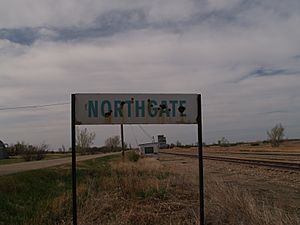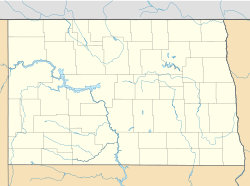Northgate, North Dakota facts for kids
Quick facts for kids
Northgate, North Dakota
|
|
|---|---|
 |
|
| Country | United States |
| State | North Dakota |
| County | Burke |
| Elevation | 1,860 ft (570 m) |
| Time zone | UTC-6 (Central (CST)) |
| • Summer (DST) | UTC-5 (CDT) |
| ZIP code |
58737
|
| Area code(s) | 701 |
| GNIS feature ID | 1030491 |
Northgate is a small place in Burke County, North Dakota, United States. It's called an unincorporated community, which means it's a group of homes or businesses that isn't officially a town or city with its own local government.
Northgate is right next to the border between the U.S. and Canada. It even shares its name with a nearby Canadian community, Northgate, in Saskatchewan. You can reach Northgate by following North Dakota Highway 8. This community used to have its own post office, but it closed in 1985.
Contents
Changes in Northgate
Over the years, some things have changed in Northgate.
Buildings and Borders
The building that used to be the Port of Entry (where people checked in when crossing the border) was taken down in 2014 or 2015. We don't know the exact reasons why it was removed.
On the Canadian side, almost all of Northgate, Saskatchewan, was also taken down between 2013 and 2014. This was done to make space for a new part of the Canadian National Railway.
Weather in Northgate
Northgate experiences a wide range of weather throughout the year.
Temperature Swings
Summers in Northgate can be quite warm, with average high temperatures in July and August often reaching the upper 70s Fahrenheit (around 25-26 degrees Celsius). However, it can get much hotter, with record highs over 100 degrees Fahrenheit (38 degrees Celsius).
Winters are very cold. Average low temperatures in January can be below zero Fahrenheit (around -19 degrees Celsius). Record low temperatures have dropped to -39 degrees Fahrenheit (-39 degrees Celsius).
Rain and Snow
Northgate gets most of its rain during the late spring and summer months, especially in May and June. The rest of the year, especially winter, sees less precipitation, often in the form of snow.
 | Kyle Baker |
 | Joseph Yoakum |
 | Laura Wheeler Waring |
 | Henry Ossawa Tanner |



